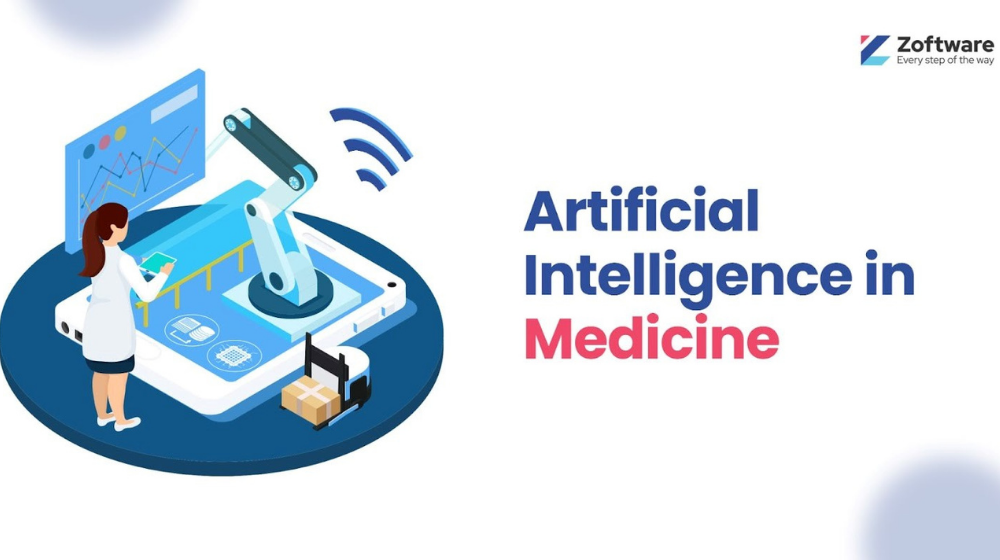Integrating artificial intelligence (AI) into healthcare has spurred an important debate: could AI replace human doctors?
With advancing technology, AI systems provide unprecedented data processing capabilities and diagnostic precision, suggesting a future where much of today’s clinical work could be automated.
We recognize that AI can analyze large datasets, recognize patterns, and even make decisions based on predictive models, which raises legitimate questions about the role of medical professionals in the years to come.
Trust, empathy, and ethical decision-making are aspects of care that AI cannot replicate. We are investigating how the partnership between AI and healthcare professionals can enhance patient care without compromising the qualities that define good medicine.
Exploring the Impact of AI Technology on the Future of Healthcare
We explore the transformative journey of artificial intelligence in medicine, which involves critical historical developments, the current integration of AI in healthcare, and its significant achievements, particularly in medical diagnostics.
Historical Milestones
Artificial Intelligence (AI) has been influencing the field of medicine since the 1960s with early expert systems, like MYCIN and Dendral, which assisted in clinical decision-making and analysis of mass spectra, respectively. By the 1980s, AI had expanded with the development of the Arden Syntax, a language designed to encode medical knowledge. These foundational systems paved the way for further innovations.
Current State of AI in Healthcare
Today, AI and machine learning are integral to many aspects of healthcare, from administrative processes to patient care. AI systems manage and analyze vast datasets efficiently, turning raw data into actionable insights.
Utilizing genetic and biometric data, AI helps tailor medical treatments to individual patients’ needs. AI-driven tools like virtual assistants offer immediate responses to patient queries and support in treatment adherence.
AI Achievements in Medical Diagnostics
AI’s precision and speed have led to breakthroughs in diagnostics, where it now aids in detecting diseases with a high degree of accuracy.
AI algorithms analyze medical images, spotting abnormalities that may indicate conditions like cancer or fractures. AI tools enhance the analysis of tissue samples, identifying patterns that the human eye could miss.
Machine learning models predict patient outcomes, facilitating early interventions for diseases like sepsis.
The Potential of AI to Replace Doctors
The integration of artificial intelligence in healthcare is poised to enhance decision-making, personalize patient care through predictive analytics, and improve surgical outcomes through advanced automation.
AI in Decision Making
With vast medical databases, AI systems provide diagnostic insights beyond human capability. For instance, IBM’s Watson can analyze a patient’s medical history, assess complex medical data, and suggest potential diagnoses and treatment options.
These systems do not replace doctors but serve as advanced decision-making tools assisting us in making more informed and accurate clinical decisions.
Predictive Analytics in Patient Care
AI enhances our ability to predict medical events by identifying risk factors and warning signs from electronic health records (EHRs). By processing thousands of patient data points, algorithms can forecast acute medical events, like heart attacks, allowing us to intervene preemptively.
Google’s AI model for predicting patient outcomes exemplifies how pattern recognition can significantly impact patient care, offering predictions on patient mortality, readmission frequency, and length of stay.
Robotic Surgery and Automation
Robotic surgery has revolutionized operating rooms, with systems such as the da Vinci Surgical System performing delicate procedures with a precision that may exceed human steadiness.
These robotic systems are invaluable extensions of our surgical teams, facilitating minimally invasive techniques and potentially reducing patient recovery time. Surgical robots do not operate autonomously but amplify our surgical skills, allowing us to perform complex surgeries with improved accuracy.
Benefits of AI in Healthcare
We are witnessing a transformative era in healthcare where Artificial Intelligence (AI) offers significant contributions. Here, we detail some specific benefits that AI brings to the field.
Improving Diagnostic Accuracy
AI algorithms, particularly those using deep learning, have demonstrated the ability to analyze complex medical data with high precision. For example, in radiology, AI systems can scrutinize thousands of images faster than human radiologists and with comparable or even superior accuracy. A study published in Nature reported that an AI system outperformed six radiologists in diagnosing breast cancer from mammograms.
- Skin cancer detection: AI applications in dermatology can distinguish between benign and malignant lesions with accuracy that’s on par with board-certified dermatologists.
Enhancing Patient Care
AI not only helps diagnose diseases but also enhances overall patient care. We can ensure continuous care by integrating AI tools into patient monitoring systems. These systems can detect subtle changes in patient conditions, potentially leading to earlier interventions.
- Personalized treatment plans: AI’s data analysis capabilities suggest tailored treatments based on the patient’s unique medical history, improving outcomes.
Reducing Healthcare Costs
Adoption of AI can lead to a more efficient healthcare system, helping to reduce costs. AI can streamline administrative tasks such as scheduling, patient follow-ups, and billing.
- Predictive analytics: By predicting which patients are at higher risk of developing certain conditions, AI enables preventative care measures that can save on future treatment costs.
Challenges and Limitations of Artificial Intelligence in Medicine
While AI offers promising advancements in healthcare, we must acknowledge the significant challenges and limitations. Here, we discuss three critical areas that require attention.
Data Privacy Concerns
In the realm of AI in healthcare, data privacy is a paramount challenge. Patient data is sensitive, and collecting, storing, and processing this data comes with the risk of breaches and unauthorized access.
Key Objects
- Ensure that health information adheres to stringent privacy policies, such as the Health Insurance Portability and Accountability Act (HIPAA) in the United States, which safeguards medical information.
- Failure to maintain privacy can lead to a loss of trust and potentially harm patients.
Ethical Considerations
Ethical considerations are at the forefront of discussions surrounding AI in medicine. Questions arise regarding decision-making authority: Should AI have the final say in diagnosis and treatment, or should it augment the expertise of human physicians?
Key Objects
- Considering the bias in AI systems, which, if unaddressed, could lead to disproportionately adverse outcomes
- Ethical injustice implies to patients that belong to a certain group based on race, gender, or socioeconomic status.
Technical and Practical Barriers
Lastly, we encounter numerous technical and practical barriers. AI development requires vast resources, including highly skilled personnel, significant financial investment, and advanced computing infrastructures.
Key Objects
- It is challenging to integrate AI seamlessly into existing healthcare workflows and ensure it operates reliably across diverse patient populations and clinical environments.
- Problems such as data incompatibility between systems and varying degrees of AI acceptance among healthcare professionals must be resolved.
Human Element in Healthcare- Can AI Match it?
In discussing the role of technology in healthcare, we cannot overlook the irreplaceable human element that encompasses empathy, ethics, and the nuanced patient-doctor relationship.
Importance of Empathy and Ethics
Empathy is the bedrock upon which patient trust is built. It involves understanding and sharing the feelings of patients, which machines cannot fully replicate. Ethical decision-making, on the other hand, requires a nuanced understanding of complex moral landscapes and the human condition.
Examples of empathy and ethics in practice include:
- Listening actively to patient concerns
- Showing compassion in difficult situations
- Navigating end-of-life care discussions
Patient-Doctor Relationship
The patient-doctor relationship is a critical component of effective healthcare. It is built on mutual respect, trust, and communication. Studies indicate that strong relationships can lead to better health outcomes.
Key aspects of this relationship:
- Having open and honest communication
- Maintaining patient confidentiality
- Collaborating on treatment decisions
Role of AI as an Assistive Tool
AI is an assistive tool for healthcare professionals, enhancing their capabilities rather than replacing the critical human touch. It provides support in various ways, such as:
- Streamlining administrative tasks
- Offering diagnostic suggestions
- Analyzing large data sets for treatment insights
However, the final decision-making rests with the healthcare provider, ensuring that personalized care and human intuition continue to guide patient treatment.
Future Perspectives of AI in Medicine
As we look toward the future of healthcare, three key areas will be transformative: in-depth AI research, the evolution of policy and regulation, and the shift to new treatment paradigms.
Advanced AI Research
We anticipate a surge in AI research focused on developing algorithms to more accurately process and interpret complex medical data.
Key objectives
- Enhancing predictive analytics for disease prevention.
- Improving diagnostic procedures through precision medicine.
Policy and Regulation in AI Implementation
Integrating AI into healthcare systems necessitates robust policies and regulations to ensure patient safety and data security.
Key objectives
- The establishment of ethical standards for AI in healthcare.
- Inclusive guidelines that govern the interoperability of AI systems in clinical settings.
New Paradigms in Patient Treatment
AI is poised to fundamentally change how we administer patient care, moving towards a more personalized approach.
Key objectives
- Leveraging AI to tailor treatment plans to the individual’s genetic makeup.
- Utilizing machine learning to monitor and adjust treatments in real-time.
Integrating AI into Medical Education
In medical education, we’re beginning to see a profound transformation in integrating artificial intelligence (AI) into our curricula. The goal is to prepare future physicians for a healthcare landscape increasingly shaped by technological advancements.
Our programs include AI-focused courses covering basic concepts, data analytics, and machine learning models. These courses equip students with the foundation to understand and utilize AI in their clinical practice.
We also incorporate case studies and clinical simulations into the curriculum. These practical applications allow students to interact with AI tools directly, applying them to virtual patient scenarios.
By integrating AI into medical education, we’re ensuring that medical professionals are adept at using these tools and keenly aware of AI’s ethical considerations and limitations in healthcare.
We aim to create a balanced and comprehensive education that champions the capabilities of AI while maintaining the irreplaceable value of the human touch in medicine.
Through our collaborative efforts, our students become pioneers in adopting AI in healthcare, ready to elevate patient care and contribute to the ongoing evolution of medical practices.
Conclusion
The integration of AI in healthcare raises transformative possibilities, yet the role of doctors remains irreplaceable. While AI augments diagnostic processes and enhances efficiency, the human touch, empathy, and nuanced decision-making are indispensable.
The future of healthcare lies in a collaborative synergy between AI and medical professionals. Harnessing a platform like Zoftware can help you select the right medical software for your health institution.
Register today to find the best software for your company!


